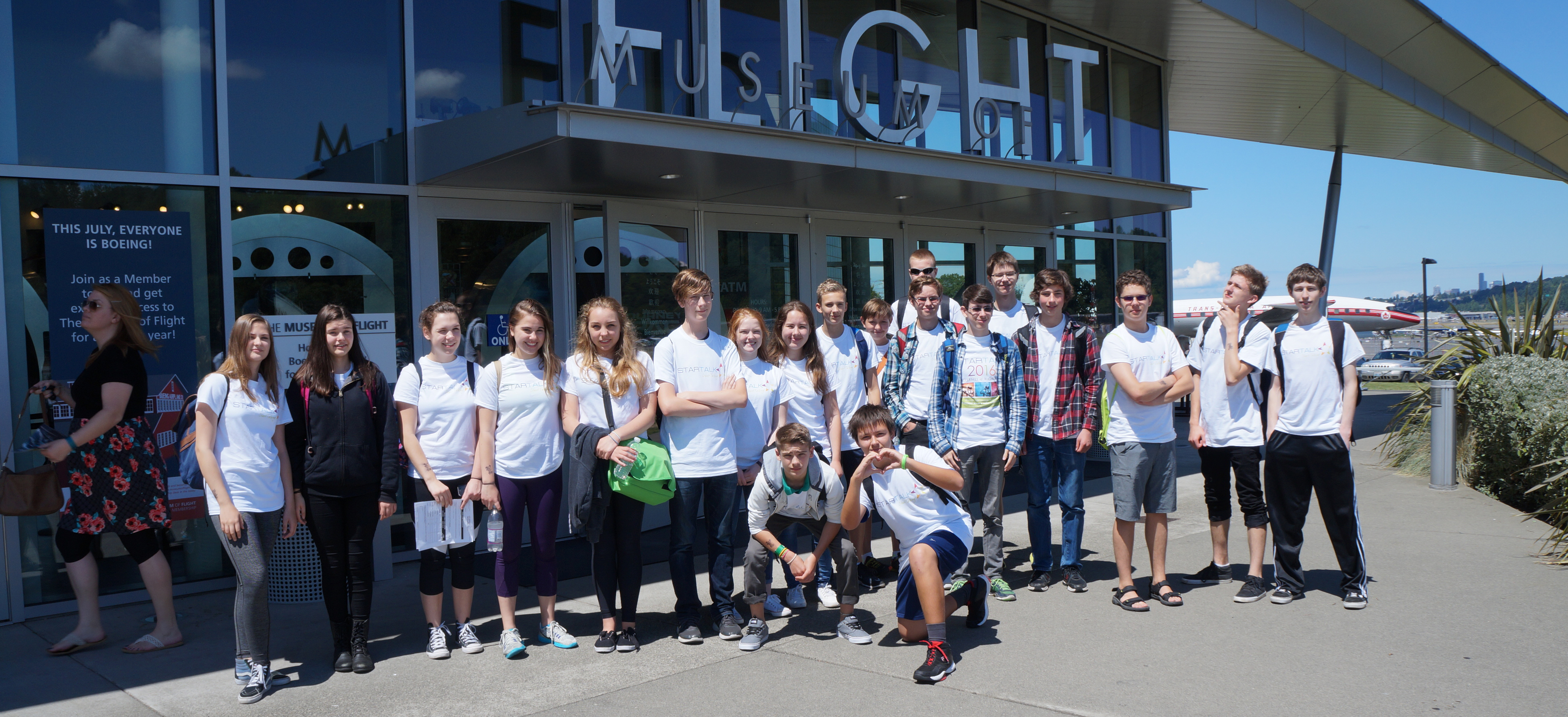During a recent mission to Mars, astronauts in the space capsule received ominous news: their oxygen had stopped working and would be depleted in seven minutes. The staff at mission control, speaking in Russian, talked the crew through the process of fixing the faulty oxygen valves. A major disaster was averted with just moments to spare.

“I don’t need this stress in my life!” a member of the life support team blurted, half-laughing, once the oxygen stabilized.
The crisis scenario was part of a Mission to Mars simulation at the Museum of Flight. The flight crew, as well as the staff at mission control, were all teens participating in a UW-based summer program designed to improve their Russian language skills as they learn STEM (science, technology, engineering, and math) content.
The UW Russian Student Program is part of STARTALK, a national, federally funded program that aims to increase the number of U.S. citizens learning, speaking, and teaching critical foreign languages. Introduced at the University of Washington in 2011, the program is one of nearly 150 STARTALK offerings across the country. In addition to the program for students, the UW offers STARTALK for teachers of Russian, Korean, Turkish, Chinese, and Portuguese.

“The government was frustrated that K-12 schools were not offering critical languages, such as Russian,” says Paul Aoki, principal investigator of UW STARTALK and director of the UW’s Language Learning Center. “They wanted to explore more innovative ways of teaching language and culture and sparking students’ awareness and interest to develop proficiency in these languages and cultures.”
The UW program combines language immersion with STEM content to take full advantage of the region’s strength in science and technology. Students arrive with a working knowledge of Russian — the vast majority have parents who are native speakers — but with plenty of room for improvement. “Their knowledge of Russian comes mostly from talking to family and friends,” says Aoki. “They typically have a strong foundation in spoken language, but their reading and writing may be limited and informal rather than formal in style.”

Over four weeks, the students delve into STEM content taught entirely in Russian by native speakers. In the morning, they cover everything from aerodynamics in aviation to powerful telescopes used to study the far reaches of the Universe. They also learn about the early history of space exploration in the U.S. and the Soviet Union. “The students are pretty stunned at what was going on in the 1950s and 60s — that there was this space race happening at that time,” says Aoki. The students also hear from Russian guest speakers, many of whom work in STEM fields in the Seattle area. The guests discuss their careers, the professional advantages of being bilingual, and the differences between the U.S. and Russian education systems.

The students use what they’ve learned in class during two visits to the Museum of Flight. On the first, they role-play during the Mission to Mars simulation; on the second, they prepare a basic flight plan and do a flight check for a Sirius plane that lives at the museum. “These visits are good centerpieces for our units,” says Svetlana Abramova, lead instructor for the UW STARTALK student program, program director for the UW STARTALK teacher program, and an affiliate lecturer in the UW Department of Slavic Languages and Literatures. “The visits bring up new feelings, new emotions. When studying languages, it’s very important to have experiences behind the words.” Other field trips have included visits to the health technology company Philips; to a Russian-language bookstore, Continent Books & Music; and to Alaska Airlines, where students tour an aircraft with an engineer who explains the mechanics of airplane wings and other technical features, all in Russian.
When not on field trips, the students spend their afternoons working on research projects, choosing from three electives. Some use LEGO-robotics to build robots that they program to simulate Mars Rovers. Others focus on linguistics, researching Russian words that have made their way into the English language. Still others study some aspect of Russian history in depth. In a four-hour conference at the end of the program, each student presents his or her research in a 15-minute talk — in Russian — to peers and a panel of experts. “They put so much of their personality, interests, talents, and knowledge into the presentations,” says Abramova. “All of them are really good. Some of them are amazing.”

One presenter from each elective option is chosen to present again the following day at the UW STARTALK closing ceremony, with parents, teachers, and a representative from the Russian Consulate in attendance. It’s a chance to celebrate all that they have learned over the past four weeks.
“They come in with familiarity with everyday speech, but through the program, they develop more advanced and professional speech and writing,” says Abramova, who has been with the program from the start. “Every year, witnessing the students’ progress is very satisfying. In four weeks, they grow tremendously.”
More Stories

AI in the Classroom? For Faculty, It's Complicated
Three College of Arts & Sciences professors discuss the impact of AI on their teaching and on student learning. The consensus? It’s complicated.

A Love of Classics and Ballroom
Michael Seguin studied Classics at the UW and now owns Baltimore's Mobtown Ballroom. The two interests, he says, are more connected than they might seem.

A Healing Heart Returns
In February, the UW Symphony will perform a symphony that Coast Salish elder Vi Hilbert commissioned years ago to heal the world after the heartbreak of 9/11. The symphony was first performed by the Seattle Symphony in 2006.